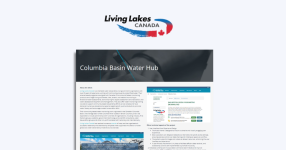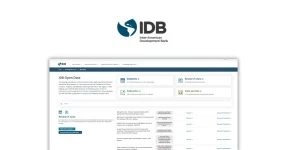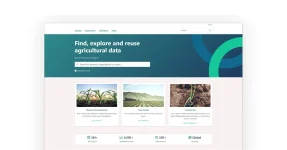Let’s look at the role that the open source software known CKAN plays in helping to power Indigenous science and data sovereignty in Canada.
Obviously, open data portals and their managers need to adopt a different approach when working with Indigenous people and rights holders and their data. Data sharing needs to take place within a framework of Indigenous control, and it must deliver some sort of collective benefit to the Indigenous community who owns the data.
Indigenous rights through collaborative research
One portal that works closely with Indigenous rights holders is the Canadian Watershed Information Network (CanWIN), an open data portal managed by University of Manitoba’s Centre for Earth Observation Science (CEOS). CEOS is a collaborative research centre focused on understanding how the earth will respond to climate change, with the Arctic freshwater marine system a particular focus due to the acute impacts of climate change on it. CanWIN collects and manages a large array of climate and hydrological data generated by this research and shares it with researchers and other stakeholders, including Indigenous groups.
CanWIN’s role in supporting Indigenous knowledge was the subject of a recent presentation by Ian Ward, Senior Solutions Architect at Link Digital to the 2025 International Humanitarian Technology Conference (IHTC), in Edmonton, Alberta Canada, in early August.
Let’s look at Ian’s talk on how CanWIN supports Indigenous knowledge and the role that the open source software known as CKAN – the Comprehensive Knowledge Archive Network – the technological backbone of the portal, plays in facilitating this.
Data and Indigenous control
The IHTC conference brought together a range of people from different sectors to present on the challenges, success stories and lessons learned from tech innovation related to meeting the United Nations’ Sustainable Development Goals (SDG). While CKAN has long been recognised as a powerful open-source data management system, it is also a Digital Public Good, a status granted to open-source solutions that contribute to the UN’s SDGs.
A decentralised open access ecosystem that fosters research collaboration and knowledge sharing, CanWIN consists of multiple platforms that host data directly or federate from external providers. In 2020 Link Digital was engaged to completely overhaul the portal using CKAN as its backbone. The portal supports the FAIR principles for data sharing: findable, accessible, interoperable, reusable. But because the portal works closely with Indigenous groups in Canada, it also attempts to operationalise the Care Principles for Indigenous Data Governance and the First Nations principles known as OCAP.
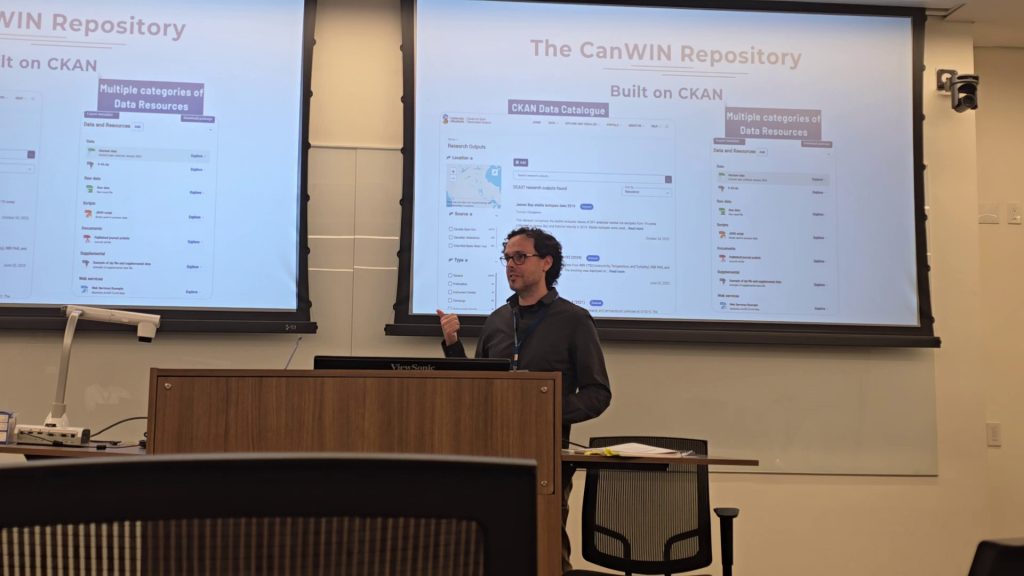
CARE and OCAP Principles
According to its website, CARE Principles “are people and purpose-oriented, reflecting the crucial role of data in advancing Indigenous innovation and self-determination. These principles complement the existing FAIR principles encouraging open and other data movements to consider both people and purpose in their advocacy and pursuits.”
The OCAP Principles – ownership, control, access, and possession – are designed to protect Indigenous ownership, control and stewardship of their data, based on the understanding that Indigenous people are in the best position to understand their own needs and govern how their data and information should be used. In other words, they should have the right to decide who should use their data and under what conditions.
Both the Care and OCAP Principles also include standards that researchers should follow in terms of their use of Indigenous data. These include that the data belongs to the Indigenous community, and they should oversee how it is used and shared and be able to take on the tasks around data sharing themselves, if they so choose. Every aspect should be documented in their languages.
Explaining why CKAN is the ideal data management system
The flexible and non-proprietorial nature of open source tools and software, such as CKAN, are ideal in this context, allowing users to avoid vendor lock-in, i.e., when users become dependent on a specific vendor for updates, support and maintenance, and compatibility with other software and, and cannot easily switch to an alternative solution or another vendor. They also give the user greater data sovereignty and the ability to set preferred standards of security, as well as complete control of their data and metadata.
CanWIN’s role in supporting indigenous data sovereignty
In his conference presentation, Ian outlined some of the many ways the CanWIN portal specifically supports the goal of Indigenous data sovereignty.
“CanWIN supports publishing all kinds of assets to support indigenous ownership of not only the data, but the whole process including steps to clean data and record which instruments were used, and platform-specific documentation. ‘Codebooks’ and ‘cookbooks’ are created for internal and user-facing documentation.”
Covering every step of the process – including installation, trouble shooting and equipment testing, and data processing and analysis – this comprehensive, publicly hosted documentation is a vital tool for empowering Indigenous communities, and allows them to independently manage and validate their data.
“GitLab private repositories are used for internal data, processes and documentation and public repositories are used for shared tools and source code.”
According to Ian, the CanWIN site makes use of other CKAN features in its work with Indigenous people. “Multilingual features are key for supporting Indigenous science and CKAN has great multilingual support, including for custom metadata and project documentation.”
CKAN not only facilitates making data easily accessible for Indigenous communities but creates intuitive data visualisations that can help simplify data access, analysis and interpretation for communities. CKAN’s data curation workflows ensure the provenance of data collected – where it has come from, how it was created and how it has been transformed and modified over time – which fosters community confidence in the ownership and management of data.
“As a fully open source project supported by a global community of contributors CKAN offers flexibility not found in proprietary offerings. This flexibility is critical for supporting Indigenous authority to control data that is collected on their territories. Access to CKAN and related tools for data curation also provides collective benefit for the community.”
Manitoba Métis Federation’s Weather Keeper Program
A good example of CanWIN’s approach to Indigenous data is the Manitoba Métis Federation’s Weather Keeper Program, a collaboration between CEOS and the Manitoba Métis Federation (MMF), an Indigenous government recognised by the federal Canadian authorities. The program supports the collection of atmospheric data in the Manitoba Great Lakes region from watershed samplings supplemented by data collected by a network of 3-meter high weather stations installed on MMF land and operated by MMF citizens.
This project is being done with a view to providing insights into how the region is responding to weather changes, including providing a snapshot of the impacts of climate change. MMF citizens maintain the weather stations and provide regular status reports of the data collected by them. Online data dashboards show the current weather conditions and provide a place to download or map additional data.
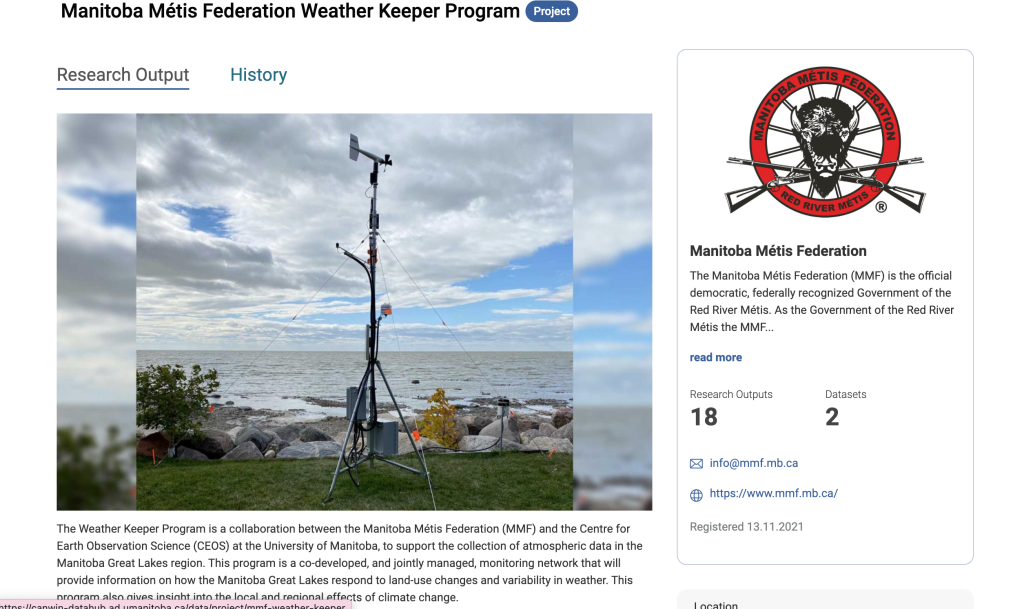
As part of his presentation, Ian outlined how the project conforms to OCAP and CARE Principles:
- On the program page, the project description was translated into the two key languages of the Metis Nation – Michif and French. Map stories are created in English, Michif and French to tell the story of the project in plain language.
- Cookbooks and codebooks were created to describe in detail the processing steps and scripts used.
- All installation, processing and troubleshooting guides are hosted publicly under the MMF’s management.
- The project aims to provide Métis citizens with a better understanding of the impacts of climate change on them by providing relevant data on water and weather conditions.
“CKAN is designed to be easy to integrate into any kind of data flow,” notes Ian. “This makes it easy to connect with the near real-time weather data feeds, Grafana visualizations and GeoNode spatial data from the Weather Keeper Program. Being one of a number of open source tools used in the program, CKAN gives the Manitoba Métis Federation ownership and control of their data in a way that’s not possible with proprietary software.”
“CanWIN is an inspiring project. It was a privilege to be able to present it at IEEE IHTC 2025 on behalf of the University of Manitoba’s Centre for Earth Observation Science.”
Canada has made significant investments in research infrastructure, yet challenges remain in making environmental data more accessible and usable. CanWIN offers a decentralized platform, aligned with recognised principles of Indigenous data management. And by prioritizing ethical data stewardship and knowledge coproduction, CanWIN fosters collaboration while supporting reconciliation efforts.
You can also read:
The case study of the work Link Digital did on the redevelopment of the CanWIN site.
Our interview with Claire Herbert, Head of Digital Strategy at CanWIN.
Do you need help with your data portal?

